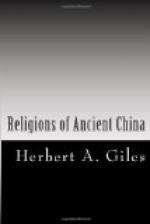Conflict of Faiths.—Han Wen-kung, A.D. 768-824, the eminent philosopher, poet, and statesman, who suffered banishment for his opposition to the Buddhist religion, complains that, “of old there was but one faith; now there are three,”—meaning Confucianism, Buddhism, and Taoism. He thus pictures the simplicity of China’s ancient kings:—
“Their clothes were of cloth or of silk. They dwelt in palaces or in ordinary houses. They ate grain and vegetables and fruit and fish and flesh. Their method was easy of comprehension: their doctrines were easily carried into practice. Hence their lives passed pleasantly away, a source of satisfaction to themselves, a source of benefit to mankind. At peace within their own hearts, they readily adapted themselves to the necessities of the family and of the State. Happy in life, they were remembered after death. Their sacrifices were grateful to the God of Heaven, and the spirits of the departed rejoiced in the honours of ancestral worship.”
His mind seems to have been open on the subject of a future state. In a lamentation on the death of a favourite nephew, he writes,
“If there is knowledge after death, this separation will be but for a little while. If there is no knowledge after death, so will this sorrow be but for a little while, and then no more sorrow for ever.”
His views as to the existence of spirits on this earth are not very logical:—
“If there is whistling among the rafters, and I take a light but fail to see anything,—is that a spirit? It is not; for spirits are soundless. If there is something in the room, and I look for it but cannot see it,—is that a spirit? It is not; spirits are formless. If something brushes against me, and I grab at, but do not seize it,—is that a spirit? It is not; for if spirits are soundless and formless, how can they have substance?
“If then spirits have neither sound nor form nor substance, are they consequently non-existent? Things which have form without sound exist in nature; for instance, earth, and stones. Things which have sound without form exist in nature; for instance, wind, and thunder. Things which have both sound and form exist in nature; for instance, men, and animals. And things which have neither sound nor form also exist in nature; for instance, disembodied spirits and angels.”
For his own poetical spirit, according to the funeral elegy written some two hundred and fifty years after his death, a great honour was reserved:—
Above in heaven there
was no music, and God was sad,
And summoned him to
his place beside the Throne.
His friend and contemporary, Liu Tsung-yuan, a poet and philosopher like himself, was tempted into the following reflections by the contemplation of a beautiful landscape which he discovered far from the beaten track:—
“Now, I have always had my doubts about the existence of a God; but this scene made me think He really must exist. At the same time, however, I began to wonder why He did not place it in some worthy centre of civilisation, rather than in this out-of-the-way barbarous region, where for centuries there has been no one to enjoy its beauty. And so, on the other hand, such waste of labour and incongruity of position disposed me to think that there could not be a God after all.”




